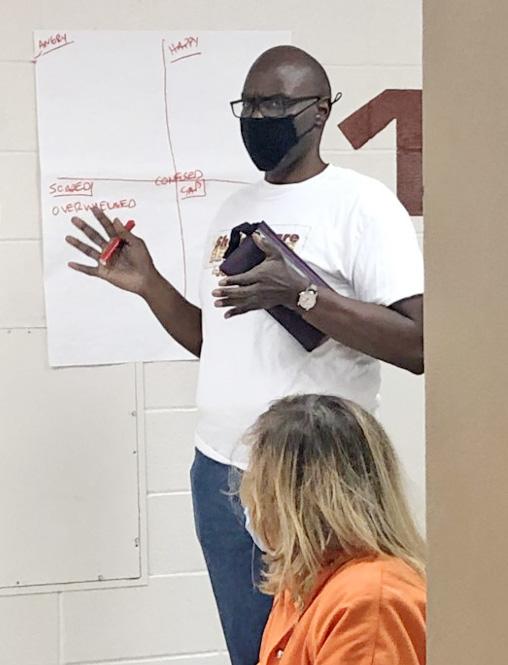
8 minute read
SHINING THROUGH
SHINING
THROUGH
Advertisement

KENTUCKY SHAKESPEARE’S JUVENILE JUSTICE PROGRAM PUTS THE SPOTLIGHT ON INCARCERATED YOUTH
entucky Shakespeare was founded by C. Douglas Ramey in 1949 as The Carriage House Players. Since its beginning, the organization has been dedicated to arts education — teaching students acting, vocal technique, theater history, and playwriting. K Kentucky Shakespeare continues this tradition of community outreach today through programs such as the Kentucky Shakespeare Juvenile Justice Program. The program is made possible through a Shakespeare in American Communities Juvenile Justice grant from the National Endowment for the Arts, in partnership with Arts Midwest. Kentucky Shakespeare is one of 10 U.S. theater companies selected for the 2020-21 program. Two people who know firsthand about the benefits of the program are Keith McGill and Jennifer Swanson. Keith is a theater teacher not only with the Kentucky Shakespeare Juvenile Justice Program, but also with Shakespeare Behind Bars, StageOne, Commonwealth Theatre Center and vActors’ Theatre’s New Voices playwriting program. He has appeared in numerous theater productions and performs internationally as a professional stand-up comedian. Jennifer, the Education Director at the Clark County Juvenile Detention Center, has been teaching for over 20 years. She holds degrees in education and psychology and has also worked as a Safe Crisis Management Trainer and a Tier 3 Behavior Coordinator. This is Jennifer’s third year at the Detention Center, which has a student-centered education program, allowing her to create individual education plans for each student. Most of the youth at the Detention Center are housed there for students learn a skill in one session that is carried on to a short period of time. Some are there for a couple of weeks, another session. others stay a few months, and while rare, some need to stay for a year. The youth participate in school five days a week, studying Jennifer adds, “When you build off of those classes, if we did the same subjects they were taking at their own middle or high something the week before, but we have a new kid the next day, school. The one difference is the Kentucky Shakespeare Juvenile those kids that were here before help Keith re-teach what they’ve Justice Program. done. Or they can share what they know so that the next part of that lesson can go on, and that gives them the spotlight, too. Twice a week, all of the Center’s residents meet for one-hour It gives them that feeling of ‘Hey, I know this’ and lets them be Shakespeare sessions led by Keith. He says that sometimes leaders among the group.”

Keith McGill working with students through the Kentucky Shakespeare Juvenile Justice Program. Photo courtesy of Jennifer Swanson.
The Kentucky Shakespeare Juvenile Justice Program creates a safe place where youth feel comfortable expressing emotions and being themselves.
THE PROGRAM IN ACTION
Keith said most sessions begin with a simple question, ranging from: “Tell me something good that happened today,” to “What’s your favorite cereal?” Then they move on to a warmup exercise like “Story Circle,” where each person adds one word to a story, or “Emotion Charades,” where a student acts out an emotion. Other times they may do a theater improv game, where Keith stresses that students “can’t get it wrong, whatever you say is the right thing.”
Then, Keith eases them into a short piece of Shakespeare, such as a sonnet, a monologue, or an action-packed scene. Students learn about this piece for the remainder of the time before their final wrap-up question. Keith always takes the last five minutes of class to ask each student to share something they liked or something they learned.
He says he does this because it teaches the youth that, “No matter what the situation is, I can take something positive away from it,” says Keith. For instance, students may think, “At least I learned what iambic pentameter is, or at least I was able to do that really fun improv game where I pretended to be somebody else.”
A SAFE PLACE TO SHARE AND LEARN
Keith and Jennifer have created a safe place where youth feel comfortable expressing emotions and being themselves. “For me, part of this program is it’s a conduit into you being able to talk about something,” says Keith. “You know, ‘I can’t talk about my family, but I can talk about the Capulets and the Montagues. I can’t talk about somebody making fun of me, or somebody using power over me, but I can talk about Prospero using power over Caliban.’ And then they can express it that way, and they can put it on those people, and they can sort of open it up without having to say, ‘My parents are oppressive or people make fun of me or I’m being bullied.’”
“One of the things I have really learned from doing this so long is that you can’t push anybody into doing anything,” he adds. “Instead, I need to go where you [the youth in the program] are ready to go. If you are ready to go there, then we’ll go there. The goal of the Juvenile Justice Program is not to produce a theatrical production after rehearsing for several months, but instead to help students learn how to express themselves. In one exercise, students are asked to create sentences with nonsensical Shakespearian insult words, like, “Thou art a boneyfaced, hair-brained boar pig!”
One young woman who did not speak at all in the first session was inspired to write a story using the insults, which she brought with her to the next session. Another woman who did not participate in the first session was the first to volunteer during the second meeting.
Keith reminds students that things said within the circle of the Shakespeare session are not repeated anywhere else. He tells them, “You can’t get this wrong. We spend so much of our lives having to get exactly the right answer, give exactly the right number.”
“I think these kids are so used to being told how wrong they are and that they’ve made mistakes,” Jennifer adds. “They’re afraid to do it again, but this is also another outlet for emotions. This is such a good outlet for them to get into a different role and use those emotions in a positive way, so they are not building up inside of them.”
LIMITLESS BENEFITS FOR ALL
Jennifer says the youth love Keith and look forward to their sessions with him. “They seem to enjoy it because it’s different.
One of the best ways to understand how meaningful the Kentucky Shakespeare Juvenile Justice Program is to its members, is by reading their words. The Kentucky Shakespeare Sonnet, below, was written by recent participants.
Their watchful eyes watch all we do right now A lonely place we feel no trace of love Together we can change our path somehow Talking to clouds, waiting for words above Keep faith and know our past won’t define us The choices that I make do not own me With hope we can put our past behind us Fake friends make white walls rather be lonely So take a stand and make a change for greatness Let’s go to school and get our education We must act quick we have no time for lateness Till then we have to learn how to be patient The future is bright where once it was bleak We need a change time to stand up and speak
They do the same thing in this place every single day, so it gives them something to look forward to other than court. Right now, they don’t even get visitation because of COVID, they just get extra phone calls but don’t even get to see their family. So, Keith is their family because we only have a handful of people that are allowed within our facility in person right now.”
Jennifer says she’s “seen kids that are really quiet and maybe not take part in a lot, who end up really shining through some of the lessons Keith has done. Kids who would not stand up and be loud and emotional get into some of those parts and really excel. Some of my rougher, tougher street kids that you would never see even pick-up Shakespeare are really getting into their parts... I have seen kids shine that I never thought would shine in that element. I have had kids who had a niche for the rapping or the rhyming. They can really show off that talent through Shakespeare, which they never realized they could do... We’re seeing some different kids be leaders that normally aren’t leaders within a classroom or other parts of our facility.” “As we pull back farther and farther from having arts in any curriculum, taking it out in favor of more testing and more STEM work, which is important, but so is being able to express yourself in a different way because not everybody is good at math or science,” Jennifer says. “Art is especially important, and I think a lot of people don’t realize that. The biggest thing I want is that for people to know — and for the students themselves to know — is that you’re not just this one label. You’re not just this person in an orange suit that has been put in this place. There are other parts to you.”
“My hope is that everyone can understand that. Next time they see somebody who has been incarcerated, [understand] that he or she is not just this crime. There’s a whole other facet to them.”
For more about the Kentucky Shakespeare’s educational outreach programs, click here.










